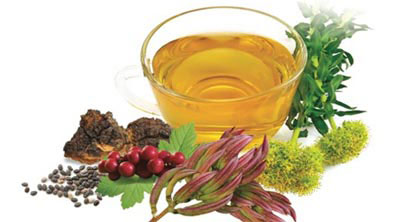
29 Jun Herbal medicine
compounds found in plants. For instance, the heart medicine digitalis was derived from the foxglove plant.
Active ingredients and herbal medicine
Herbal medicines contain active ingredients. The active ingredients of many herbal preparations are as yet unknown. Some pharmaceutical medications are based on a single active ingredient derived from a plant source. Practitioners of herbal medicine believe that an active ingredient can lose its impact or become less safe if used in isolation from the rest of the plant.
For instance, salicylic acid is found in the plant meadowsweet and is used to make aspirin. Aspirin can cause the lining of the stomach to bleed, but meadowsweet naturally contains other compounds that prevent irritation from salicylic acid.
According to herbal medicine practitioners, the effect of the whole plant is greater than its parts. Critics argue that the nature of herbal medicine makes it difficult to give a measured dose of an active ingredient.
Medicinal uses for specific herbs
Herbal medicine aims to return the body to a state of natural balance so that it can heal itself. Different herbs act on different systems of the body. Some herbs that are commonly used in herbal medicine, and their traditional uses, include:
- echinacea – to stimulate the immune system and aid the body in fighting infection. Used to treat ailments such as boils, fever and herpes
- dong quai (dang gui) – used for gynaecological complaints such as premenstrual tension, menopause symptoms and period pain. Some studies indicate that dong quai can lower blood pressure
- garlic – used to reduce the risk of heart disease by lowering levels of blood fats and cholesterol (a type of blood fat). The antibiotic and antiviral properties of garlic mean that it is also used to fight colds, sinusitis and other respiratory infections
- ginger – many studies have shown ginger to be useful in treating nausea, including motion sickness and morning sickness
- ginkgo biloba – commonly used to treat poor blood circulation and tinnitus (ringing in the ears)
- ginseng – generally used to treat fatigue, for example during recovery from illness. Also used to reduce blood pressure and cholesterol levels, however overuse of ginseng has been associated with raised blood pressure
- hypericum – commonly known as St John’s wort. Studies have suggested that St John’s wort is just as effective as some pharmaceutical antidepressants in treating mild to moderate depression. It is also used for anxiety and insomnia. However, St John’s wort can interact with a number of prescription , including the oral contraceptive pill, and stop them from working properly.
Do not self-diagnose ailments
It is very important that people do not self-diagnose any health conditions. Any medication (herbal or otherwise) should be taken under the supervision of a knowledgeable and qualified practitioner.
Special considerations for herbal medicine
Herbal medicines can be mistakenly thought to be completely safe because they are natural products. This is not correct.
Herbal medicines may produce negative effects such as allergic reactions, rashes, asthma, headaches, nausea, vomiting, and diarrhoea that can range from mild to severe. Like other prescription medications, herbal medicine should always be prescribed by a qualified and registered practitioner.
Always tell your herbal therapist:
- which over-the-counter, herbal supplements, vitamins and prescription medications you are taking
- any allergic reactions you have experienced
- if you are pregnant or planning to become pregnant.
Be aware herbal medicine can interact with other medications
Herbal medications and supplements may interact in harmful ways with over-the-counter or prescription medicines you are taking.
Taking herbal supplements may decrease the effectiveness of other drugs you are taking or may increase the negative side effects.
If you are considering taking herbal medications it is always a good idea to talk to your doctor about possible side effects and interaction with other medications you are taking.
Purchase herbal medicine products from a reputable supplier
Not all herbal medicines that are sold are safe. Always purchase products from a reputable practitioner or pharmacist.
Be careful about purchasing herbal medicines over the internet. Unregulated herbal medicines from overseas may not be manufactured to the same quality and standard as regulated medicines. In some cases, products bought over the internet have been found to have dangerous levels of lead, mercury or arsenic, which can cause serious health problems.
Herbal medicines made in Australia are subject to regulations. Consult with your pharmacist about the safety and effectiveness of the herbal medicine or supplements you are thinking of buying. If you are considering taking herbal medicine, it is recommended that you:
- Never stop taking prescribed medications without consulting your doctor.
- Always tell your doctor if you are planning to start a course of herbal medicine for your condition.
- Seek advice from your qualified health practitioner, your doctor or your pharmacist about the herbal medicine’s safety, quality and effectiveness.
- Always purchase products from a reputable practitioner or pharmacist. Be cautious about buying herbal medicines or supplements manufactured overseas.
- Take all herbal medicines strictly as prescribed and consult your health practitioner immediately if you experience any adverse reactions.
Where to get help
- Your GP (doctor)
- A qualified herbal therapist or naturopath
- Your pharmacist
- Medicines Tel. 1300 MEDICINE (1300 633 424) – for information on prescription, over-the-counter and complementary medicines
- Adverse Medicine Events Tel. 1300 134 237 – to report a problem with your medicine



No Comments